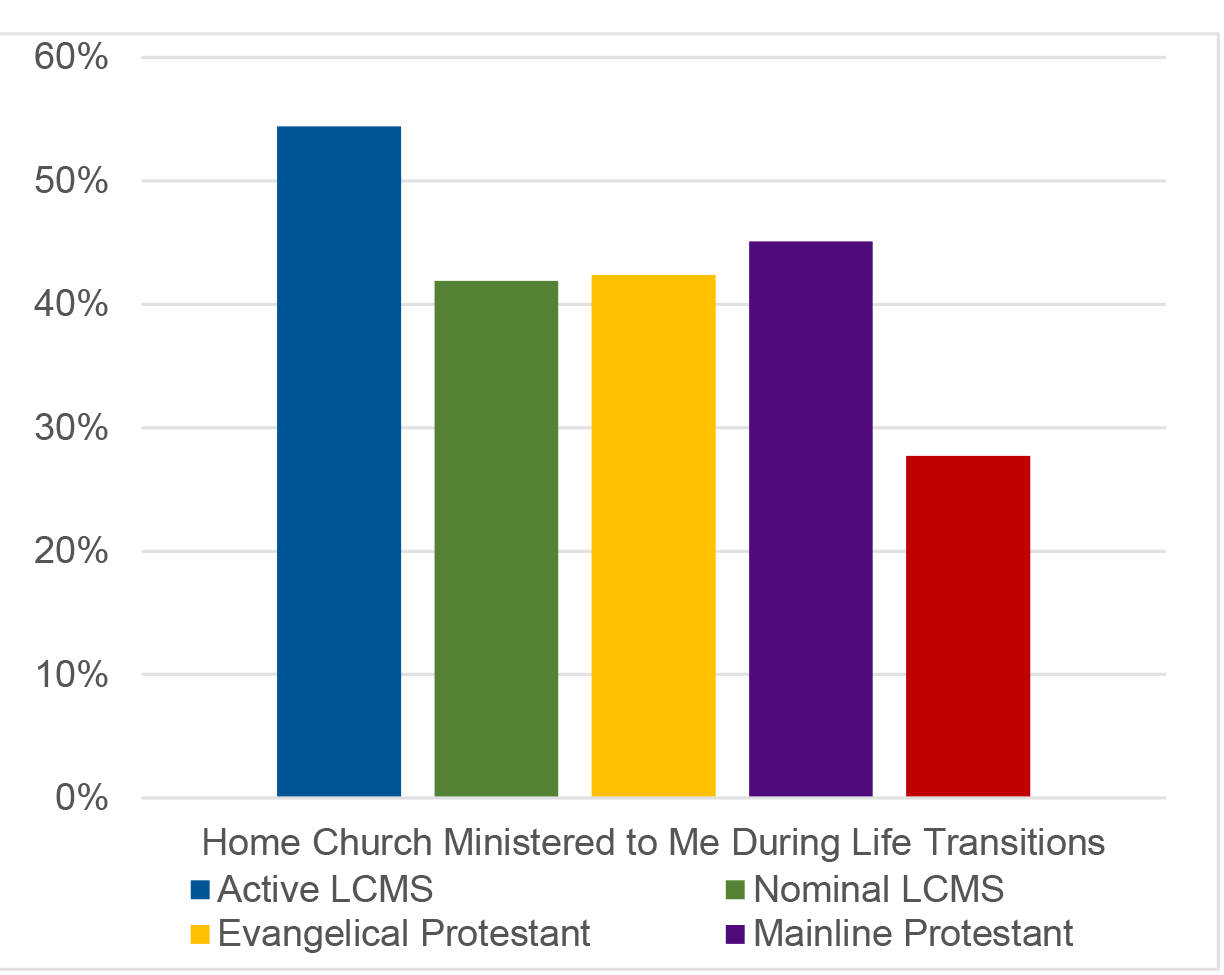Download a PDF of this article to print and share.
Young people naturally and regularly go through transitions in life. Ideally, families, Christian congregations, and Young people naturally and regularly go through transitions in life. Ideally, families, Christian congregations, and mentors can bring much-needed stability for a young person in this life phase. As teens move to adulthood, they may experience moving from middle school to high school, transitioning to college or the military, moving due to parents’ employment, significant loss of a loved one, moving to find their own employment, changing of peer groups, or a mentor moving away. These occurrences can provide for growth in one’s relationships with Jesus and His Church, or sometimes Satan uses these transitions to pull young people away from God’s promises and means of grace and Christian relationships.

LCMS Youth Ministry research showed the importance of parents and congregations preparing for and engaging young people during times of transition and crisis. This article will focus on two transition scenarios where LCMS congregations can support parents and young people. The hope is that by faithfully connecting young people to God’s Word and Sacraments in the Church and Christian relationship, it increases the possibility that they will stay connected to Christ’s gifts and people beyond the youth years:
- High School youth transition out of high school to college, workforce, or the military
- Church Worker/Staff transitions whether it be contentious or a healthy transition
From High School to the Next Phase
Only 55% of active LCMS young adults agree that their home congregation ministered to them during times of life transitions. This was the strongest response of any group, showing the propensity of youth who left for mainline denominations or other evangelical denominations, or those who have completely left the church, to receive even less spiritual care during times of transition. We saw this impact particularly after high school graduation. Active LCMS young adults report that their weekly worship attendance dropped from 88% to 66% after high school graduation, but it recovered in young adulthood to 74%.
In contrast, those no longer attending church report that their weekly worship attendance dropped from 68% to 16% after graduation, and that number becomes almost nothing in young adulthood. Transitions such as graduation are critical moments where congregations and parents can support a young person’s relationship with Jesus as they find a new church home or establish a new, adult relationship with their existing congregation.
Congregations and their pastors, DCEs, and other church workers have so much on their plate to minister to people in their midst. It’s easy to understand how college students, military personnel, or other young adults who have graduated from high school may easily become “out of sight, out of mind” in a ministry perspective. Of the congregations who responded to our survey, 23% reported that they did not have accurate records of Junior Confirmations from ten years ago. Only 28% reported having digital records. Congregations may struggle to be successful in ministering to individuals over their lifetime if there are no usable records and relational connection.
A few matters for LCMS congregations and church workers to consider:
Parents and churches can consistently and continually speak of the importance of staying connected to Jesus, “the way, the truth, and the life” (John 14:6) throughout one’s life. Life circumstances may change, but Christ’s Church, hearing the Gospel, being assured of their forgiveness of sins, and studying God’s word provides stability through transitions.
Churches can help parents and youth prioritize the spiritual environment, or growth opportunities, when choosing a college campus.
Recognizing the blessings of temporal relationship formed in Christ, churches and parents can speak to the importance of young people finding Christian community on a campus or wherever they may be heading.
Churches can actively engage their college students with an LCMS campus ministry or congregation, or another student ministry grounded in God’s Word. Our research showed that simply having a college campus close to a congregation did not increase the engagement of young adults. Rather, congregations should actively engage the students and invite them into the community. Churches can connect military members to LCMS congregations and chaplains.
Churches can review how high school graduates are treated as members, considering these young people now face perhaps the most substantial transition in their spiritual life. Pray regularly, and publicly, for these students. Encourage them to hear and read the Gospel of Jesus and read His Word. Welcome them back at breaks and celebrate with them at milestones.
Spiritually prepare students for this substantial transition. Discuss important matters like freedom, relationships, on-campus temptations, and possible onslaughts from academia. This could be especially important depending on a student’s major. Point them to God’s means of grace, and Jesus’ forgiveness and word of Promise, and the strength of the Holy Spirit.
Put emphasis on young adults who stay in our general geographical vicinity and engage them in the Christian community now as full-fledged adults and invite them into leadership.
Create a culture where connection with college students is valued and systematized through the four years of college so when they graduate, the congregation still has a relationship and are actively ministering to them.
Home congregations take the initiative to walk with college students through the transition after college into a church home. Keep connected with them until they find a new, stable church home, even if outside the LCMS.
Church Worker Transition
Both studies spoke to the importance of church workers in the lives of young people. (The faith practices and relationship with parents is the top indicator of retention.) Congregations that added youth ministry staff experienced higher rates of retention (in the LCMS) into adulthood (34%) than congregations with no change (28%) and congregations which reduced youth ministry staff (19%). Adding staff also decreased the rate of young people leaving before high school graduation. 23% left the congregations who added staff, 32% with no staffing change, 38% for congregations who reduced youth ministry staff. We recognize that the data does not speak to causality, but it gives a strong indication that when resourcing is increased towards youth ministry and the long-term relationship with a church leader is established, that has an impact on retention.
As one would expect, relationships between young people and their pastors, DCEs, and other staff are very important in the lives of individual young people and the life of the church. Millennials were asked to name three to five people who have been influential in their faith life. Along with parents, pastors, LCMS “youth ministers,” and LCMS teachers were some of the most influential in their faith life.
Another way to see the importance of these relationships is when the church worker leaves to take another Call or for a different reason. Church workers and laity need to actively hand off and take on people during congregation changes. In the congregational study, there was a 35% LCMS retention rate when the pastor had been present for their confirmation. There was only a 24% LCMS retention rate if the pastor had not been present. Pastors who had been present had a 25% rate of not knowing where a confirmand was today in contrast to 43% if the pastor was not. (Also, keep in mind the data provided above regarding the number of congregations who do not keep accurate or digital records. Good record keeping can be a vital tool for a church worker new to a congregation.)
A few matters for LCMS congregations and church workers to consider in church worker transition:
Be encouraged and strengthened in the forgiveness of sins, given to us in Jesus Christ! Young people, pastors, church workers, and parents will fail and fall short in times of transitions. However, Jesus forgives us and bears fruit in us to show care and compassion for others.
When church staff who work with youth transition to another place, it is time well spent to bring closure for the youth and the worker. Honor the relationships which were built and have a solid understanding of how and when those relationships continue.
When staff transition particularly affects ministry to young people (especially confirmed youth), give them specific and additional time to process, ask questions, and be engaged in the conversation about next steps.
Church leadership should consider communicating directly to young people about church work transitions (in worship settings, at meetings where young people are present, or make a separate appointment to attend a youth event).
Young people can be engaged in a church work transition or Call process. They can be given a voice and possibly a place on the Call Committee.
Church workers new to a congregation can remind themselves the congregation’s ministry didn’t start with them. (Think of those young people confirmed 10 years ago…can lay people or other staff help build relationships with young people who are not currently connected with the church’s ministry?)
A new staff may be able to engage a family which has lost connection with the church. Perhaps, there was a personality conflict and the Holy Spirit may use a new person to start and form a relationship.
Congregations should plan well for youth ministry interims and vacancies. Don’t allow for a young person or family to “fall through the cracks” during these times of transition. The congregation works together to connect God’s people to Jesus and it’s not alone the work of pastor or other staff.
This article was first printed in the Spring 2018 NADCE Quarterly.
Discussion Questions
- Who in your congregation is or could be responsible for proactively maintaining relationships with young adults following high school graduation and as they leave home?
- What resources does your congregation provide these individuals to do their job?
- As young adults leave to continue their education or for other reasons, what is your congregation doing to connect your young adults with other pastors and congregations in their new locations?
- What is being done to inform pastors or congregations that your young adults are coming to their community?
- What should be done in each of the previous instances to ensure young adults get connected with a faith community in their new location?










0 Comments